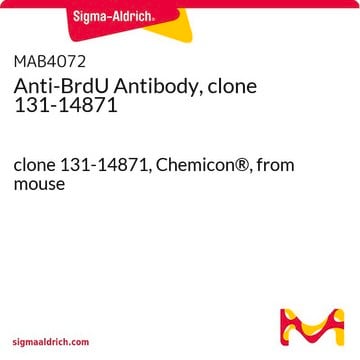MABC609
Anti-Thymidylate Kinase/TMPK Antibody, clone 1A5.1
clone 1A5.1, from mouse
Synonym(e):
Thymidylate kinase, Thymidylate Kinase/TMPK, dTMP kinase
About This Item
Empfohlene Produkte
Biologische Quelle
mouse
Qualitätsniveau
Antikörperform
purified antibody
Antikörper-Produkttyp
primary antibodies
Klon
1A5.1, monoclonal
Speziesreaktivität
human
Methode(n)
immunohistochemistry: suitable (paraffin)
western blot: suitable
Isotyp
IgG2aκ
NCBI-Hinterlegungsnummer
UniProt-Hinterlegungsnummer
Versandbedingung
dry ice
Posttranslationale Modifikation Target
unmodified
Angaben zum Gen
human ... TK1(7083)
Allgemeine Beschreibung
Immunogen
Anwendung
Apoptose & Krebs
Apoptose - Weiterführende Produkte
Immunohistochemistry Analysis: A 1:50 dilution from a representative lot detected Thymidylate Kinase/TMPK in human breast cancer and human ovarian cancer tissue.
Qualität
Western Blotting Analysis: 0.5 µg/mL of this antibody detected Thymidylate Kinase/TMPK in 10 µg of Jurkat cell lysate.
Zielbeschreibung
Physikalische Form
Lagerung und Haltbarkeit
Sonstige Hinweise
Haftungsausschluss
Not finding the right product?
Try our Produkt-Auswahlhilfe.
Lagerklassenschlüssel
12 - Non Combustible Liquids
WGK
WGK 1
Flammpunkt (°F)
Not applicable
Flammpunkt (°C)
Not applicable
Analysenzertifikate (COA)
Suchen Sie nach Analysenzertifikate (COA), indem Sie die Lot-/Chargennummer des Produkts eingeben. Lot- und Chargennummern sind auf dem Produktetikett hinter den Wörtern ‘Lot’ oder ‘Batch’ (Lot oder Charge) zu finden.
Besitzen Sie dieses Produkt bereits?
In der Dokumentenbibliothek finden Sie die Dokumentation zu den Produkten, die Sie kürzlich erworben haben.
Unser Team von Wissenschaftlern verfügt über Erfahrung in allen Forschungsbereichen einschließlich Life Science, Materialwissenschaften, chemischer Synthese, Chromatographie, Analytik und vielen mehr..
Setzen Sie sich mit dem technischen Dienst in Verbindung.






